The global pupillometer market size is calculated at USD 480.91 million in 2025 and is forecasted to reach around USD 758.55 million by 2034, accelerating at a CAGR of 5.20% from 2025 to 2034. The North America pupillometer market size surpassed USD 137.09 million in 2024 and is expanding at a CAGR of 5.37% during the forecast period. The market sizing and forecasts are revenue-based (USD Million/Billion), with 2024 as the base year.
The global pupillometer market size was estimated at USD 456.96 million in 2024 and is predicted to increase from USD 480.91 million in 2025 to approximately USD 758.55 million by 2034, expanding at a CAGR of 5.20% from 2025 to 2034.
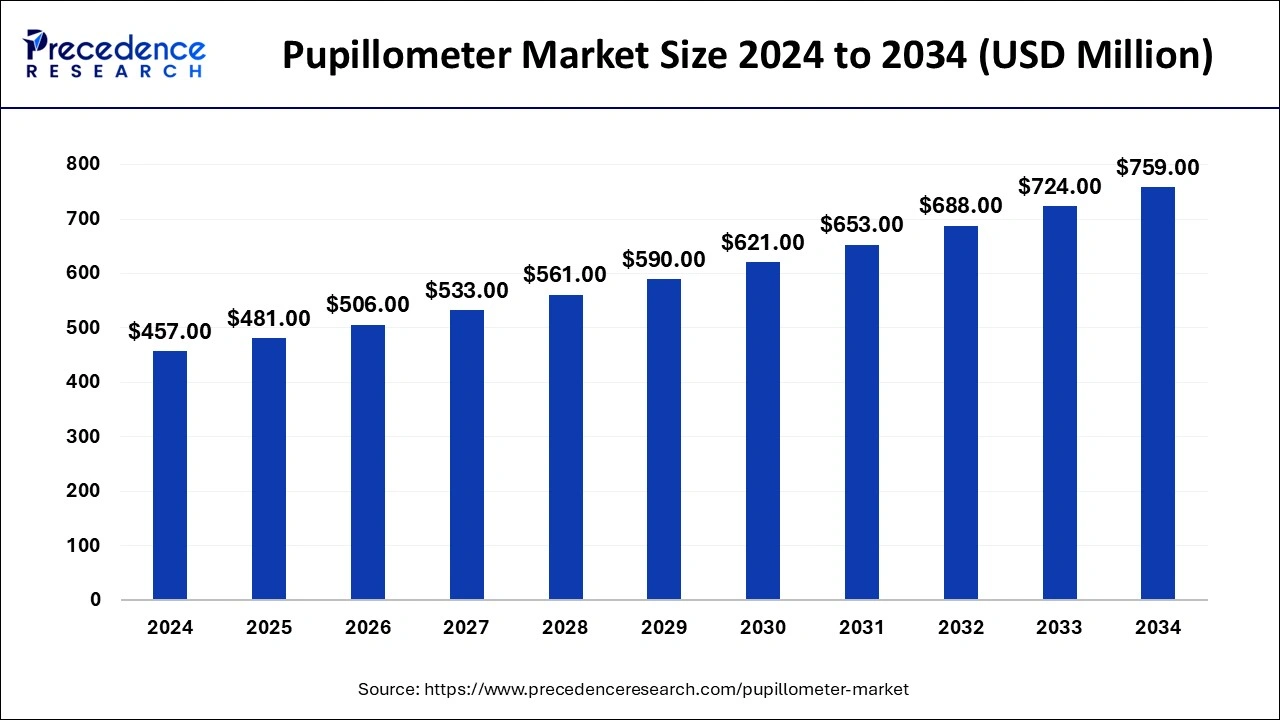
The U.S. pupillometer market size was estimated at USD 102.82 million in 2024 and is projected to surpass around USD 174.67 million by 2034 at a CAGR of 5.44% from 2025 to 2034.
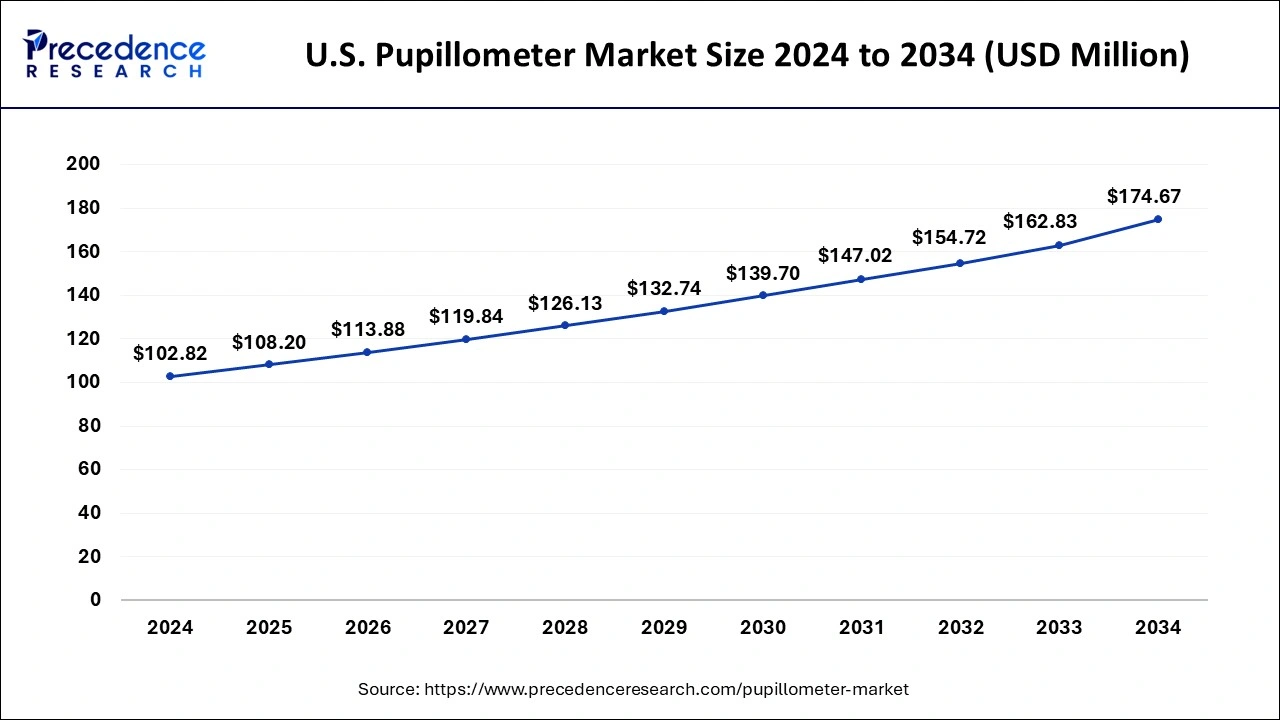
North America accounted for a large market share in the pupillometer market for the year 2024, because of a large population suffering from neurological disorders and eye health issues. Pupillometry is widespread in United States. US is a base for several market leaders in the pupillometry market, like the NeurOptics, which designs high quality pupillometers. North America is a hub for technological innovation, including in the healthcare sector. Many leading medical device manufacturers and innovators are based in North America, continually developing and refining pupillometry technology. This technological edge often gives North American companies a competitive advantage in the global market.
North America is home to numerous research institutions, universities, and medical schools conducting research in various medical fields, including ophthalmology and neurology. This research often leads to the development of new pupillometry techniques and applications, further driving market growth.
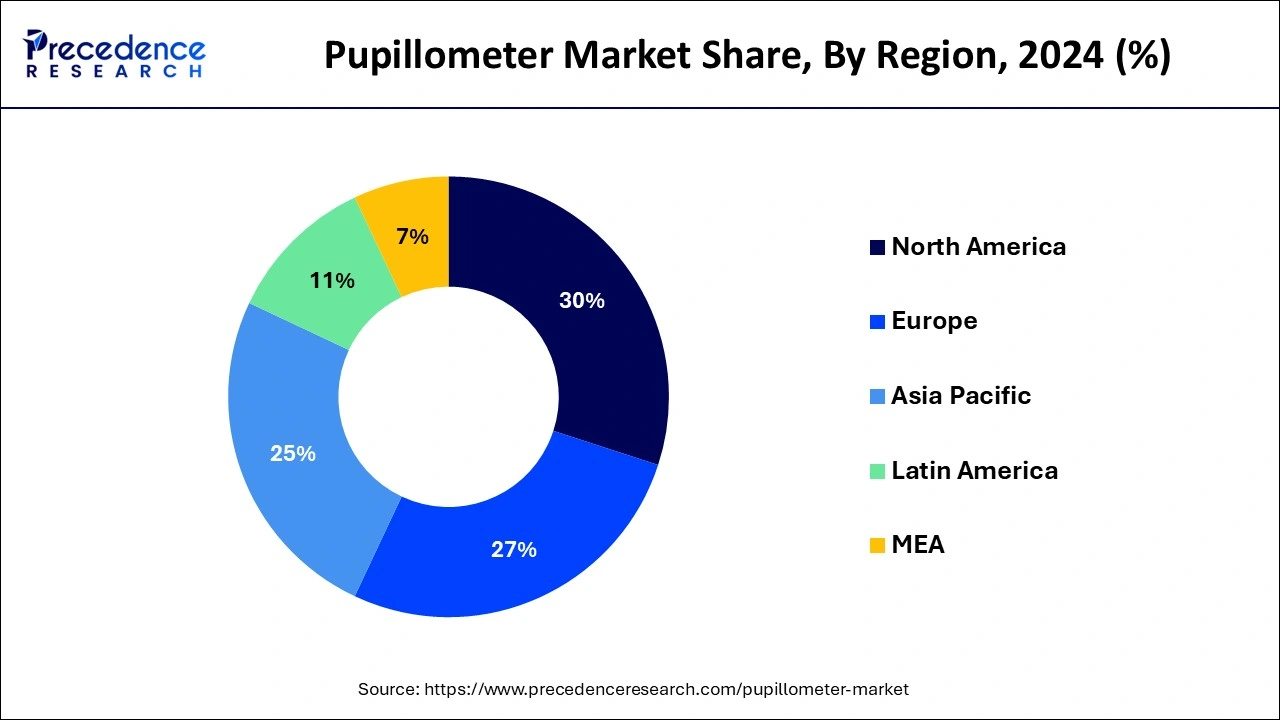
Asia Pacific will be the fastest growing region during the forecast period, and Japan is the fastest growing marketplace in the Asia Pacific pupillometer market. An increased number of online retailers and distributors have entered the market. Pupillometer market is growing in India because of increased prevalence of neurological disorders. India is a home for an increased ageing population. Not only the ageing population, but also the middle-aged population is seen to be suffering from stroke, epilepsy, migraines, etc.
Many governments in the APAC region have launched initiatives to improve healthcare access and quality. This includes policies to enhance medical research, incentivize healthcare investments, and subsidize medical equipment procurement. Such supportive measures create a conducive environment for the adoption of pupillometers and other medical devices.
Pupillometer is a device that is used to measure the size of a human pupil of the eye. This measurement of the pupillary dilation of the eye is called pupillometry. Using techniques like magnetic resonance imaging (MRI) and computed tomography (CT scan), there has been found a correlation between pupil dilation and brain activity. Hence pupillometry becomes useful when studying cognition. Studies show that people who suffer from mental health issues, anxiety, depression, or Parkinson’s, show abnormal pupil activity.
| Report Coverage | Details |
| Growth Rate from 2025 to 2034 | CAGR of 5.20% |
| Market Size in 2025 | USD 480.91 Million |
| Market Size by 2034 | USD 758.55 Million |
| Largest Market | North America |
| Base Year | 2024 |
| Forecast Period | 2025 to 2034 |
| Segments Covered | By Mobility, By Type, By Application, and By End-use |
| Regions Covered | North America, Europe, Asia-Pacific, Latin America and Middle East & Africa |
Technological advancements
The growth in pupillometer market is driven by several factors. A major factor is technological advancements in the healthcare industry. People have become more aware of their ocular health, and many don’t compromise in this case. Mental health is also being taken seriously, and there are several neurological disorders like brain injuries or strokes, that are prevalent.
A correlation between pupil dilation and mental health further drives the growth of pupillometer market. There is a growth in elderly population, and as a person ages, the eye health deteriorates too. Geriatric people suffer with diseases like glaucoma, or hypermetropia. In such cases, it becomes important to have high quality instruments while addressing the issues.
Expensive devices
Although the pupillometer is having a lot of advantages and is booming in the market, there are some factors that restrain its growth. These devices are expensive, and the hospitals that don’t have enough funds, can’t afford them. Hence steps can be taken to produce pupillometers with affordable prices and high quality. Because of not having a proper knowledge about pupillometers, they can’t be used to their maximum potential. Hence it also becomes important to train the hospital staff properly in order to ensure that the devices are used in the best way possible. Technology is constantly evolving, and when an alternative is found to pupillometers, they will be replaced by that technology. Once manufactured, they also need to be tested for their accuracy and reliability.
Rising research and development activities
A major improvement will happen in the healthcare industry as the pupillometer market grows. As pupillometer is not only useful for diagnostics in ocular health but also helpful while diagnosing mental health issues, this will promote research in the field of cognitive studies as well.
Old age leads to several eye diseases like cataract or glaucoma, leading to poor vision. Governments across the globe are promoting awareness on ocular health by introducing policies. As social media has gained popularity, several teenagers have increased their screen times. Additionally, more people have entered corporate and IT jobs, which makes them to spend more time working on the laptops. This results in poor eyesight, and pupillometer manufacturers can open opportunities for opticians and ophthalmologists too.
The table-top pupillometers segment reported for the largest share of the pupillometer market in 2024. Pupillometers are not just used singly but are often integrated with other devices like corneal topographers, pachhymeters, keratometers. Integrating it with other devices provides a proper idea during diagnostics. Table-top pupillometers are more robust and have more features. Hence, they are found in hospitals more commonly. Doctors get an overall view of the problems a patient has and can take proper steps towards regulating their eye health. Advancements have happened in the table-top pupillometers, and industries are also committed towards improving the quality of patient care.
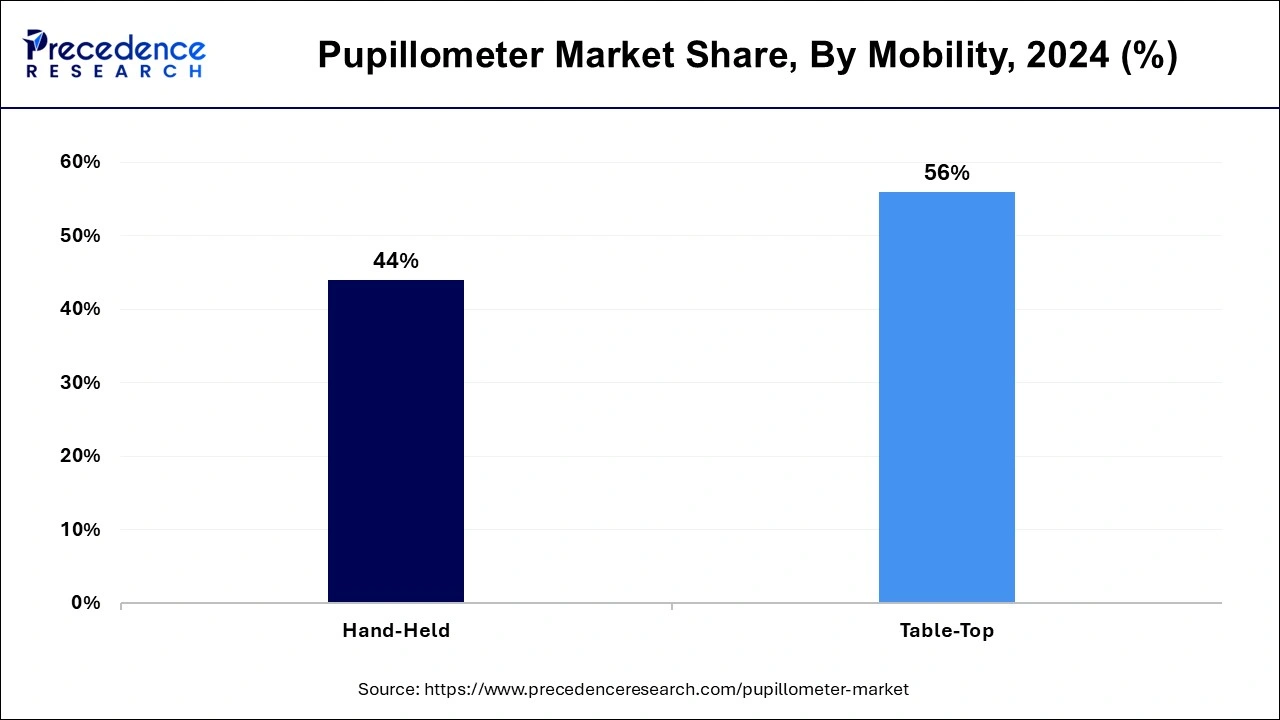
The hand-held pupillometers segment will grow at the fastest rate during the forecast period. They are being widely adopted because one can capture accurate images of the pupil, with a high efficiency. This can be useful when diagnosing cognitive disorders. Hand-held pupillometers are portable, and this is a factor contributing to the growth of pupillometers. The hand-held pupillometers will take the pupillometer market in a positive direction.
The video segment held the largest share of the pupillometer market in 2024. The segment is observed to continue the growth at a significant rate during the forecast period. The full process of pupil dilation is recorded by a video pupillometer. For recording videos of high quality, the video pupillometers have a processor, an infrared camera, LED source, and optics of high quality. Videos are recorded at different times, and doctors can track the pupil size changes with time.
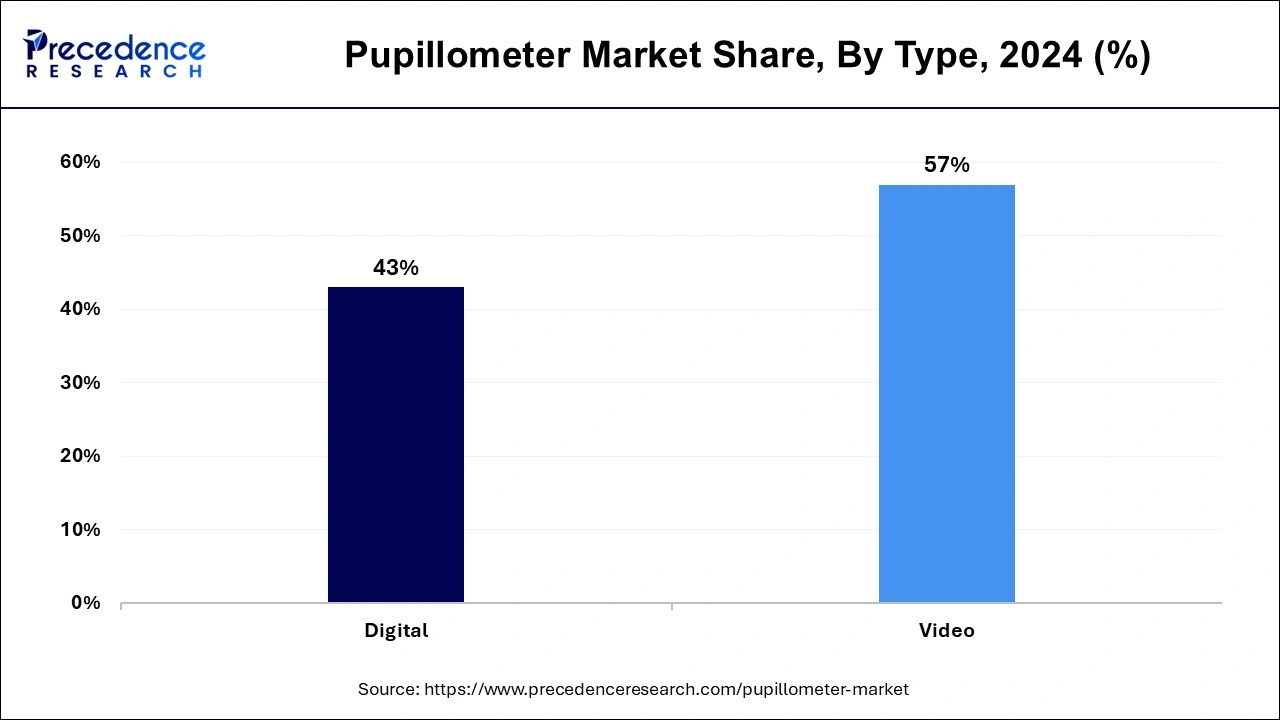
The digital segment will be the fastest growing segment in the forecast period in the pupillometer market. Digital pupillometers offer a high accuracy while measuring pupil size. Multiple frames of the pupil are recorded per second and an average of these measurements is taken to get an idea about the pupil dilation. Because digital pupillometers can record all variations in pupillary dilation, they are extremely useful while studying neurological disorders.
The ophthalmology segment was dominant in the market during 2024 and accounted for the largest share in the pupillometer market. A primary reason behind this was increase in the pupillary dilation study in order to diagnose retinal diseases and studying the visual system. Retinal damage can be detected using pupillometers. Retina is an extremely sensitive part of the eye, that comprises of rod and cone cells, that are useful for the image formation and processing. The rising rate of LASIK surgery has promoted the application of pupillometer, that helps in understanding the risk, and then decide whether or not to do it.
the oncology segment will be the fastest growing segment during the forecast period. Pupillometry is rising in the therapeutics for oncology. As visual signals are further relayed to the brain, there is a connection between the eyes and the brain. Pupillometry can be done to study brain tumours. The size of pupil and its behaviour also serves as indicator for brain trauma or strokes. Hence, more studies including the use pupillometry in oncology will take the pupilometer market in a positive direction.
The hospitals segment dominated the pupillometer market and accounted for the largest share of revenue. Pupillometers are being used in the critical care units, which will show a further growth in the segment. Pupillometers are primarily used in medical settings for assessing neurological function, especially in critical care situations such as traumatic brain injury, stroke, or post-surgical monitoring. Hospitals are the primary locations where such patients are treated, making them the natural clientele for pupillometer usage.
Hospitals typically have more advanced medical equipment and resources compared to other healthcare settings. Pupillometers often require high precision and reliability, which hospitals can afford and prioritize in their budgets.
The eye clinics segment will show the fastest growth rate during the forecast period. In several eye clinics, pupillometry is included as a major diagnostic procedure. Ophthalmic clinics use pupillometry not just for diagnostics, but also for prevention and control. In order to avoid post-surgery problems in vision, pupillometry is useful. With the help of pupillometry, we can determine which type of surgery or laser treatment can be useful for the eye.
By Mobility
By Type
By Application
By End-use
By Geography
For inquiries regarding discounts, bulk purchases, or customization requests, please contact us at sales@precedenceresearch.com
No cookie-cutter, only authentic analysis – take the 1st step to become a Precedence Research client